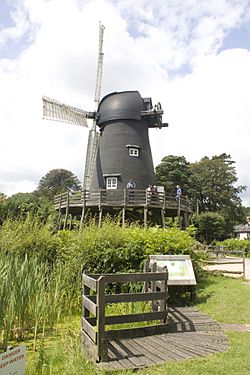Bursledon Windmill facts for kids
Quick facts for kids Bursledon Windmill |
|
|---|---|

Hampshire's only working windmill
|
|
| Origin | |
| Mill name | Bursledon Mill |
| Mill location | Bursledon, Eastleigh, Hampshire |
| Grid reference | SU 482 108 |
| Coordinates | 50°53′42″N 1°18′54″W / 50.894916°N 1.315001°W |
| Operator(s) | Hampshire Cultural Trust |
| Year built | 1814 |
| Information | |
| Purpose | Corn mill |
| Type | tower mill |
| Storeys | Five storeys |
| No. of sails | Four sails |
| Type of sails | Common sails |
| Windshaft | Wood |
| Winding | Hand winded via chain and wheel |
| No. of pairs of millstones | Three |
| Other information | |
|
Listed Building – Grade II*
|
|
| Designated | 14 February 1983 |
| Reference no. | 1281479 |
Bursledon Windmill is a historic building in Bursledon, Hampshire, England. It is a Grade II* listed site, which means it is very important and protected. This windmill has been carefully restored and can now work again, just like it did long ago. It's a great example of old technology!
Contents
What is Bursledon Windmill?
Bursledon Windmill is a tall, five-story building shaped like a tower. It has a special platform at the first floor where workers could adjust the sails. The top part, called the cap, looks like a boat and can be turned by a chain and wheel to face the wind.
How the Windmill Works
The windmill has four large Common sails. These sails catch the wind and turn a strong wooden pole called a windshaft. This windshaft is connected to a big wooden brake wheel inside the mill.
The brake wheel then turns another wooden wheel, the wallower, which is at the very top of a long upright shaft. At the bottom of this upright shaft, a large wooden great spur wheel spins. This wheel powers three pairs of millstones. These stones grind grain into flour from underneath, which is why they are called underdrift millstones.
History of the Windmill
Bursledon Windmill is the only working windmill left in Hampshire. It was built in 1814 by a woman named Mrs. Phoebe Langtry. It replaced an older, smaller windmill that was built around 1768. Some parts of the older mill's machinery were even used in the new one.
Early Years and Millers
When it was first built, the mill was mortgaged for £800. This means money was borrowed against it. The mill was sold in 1820. It kept working until the 1880s. Mrs. Langtry's son, William Langtry, was one of the early millers.
A family named Cove, led by John Cove, worked the mill from 1847 to 1871. John Cove came from Wiltshire and had worked in a mill in Portsmouth before. His family became very important in Southampton. The last miller to own the mill was George Gosling, who bought it in 1872.
Why the Windmill Stopped Working
Eventually, the windmill stopped grinding grain. To protect the machinery inside, a flat roof was put over the cap frame. This helped keep the gears and shafts safe from the weather.
However, by 1931, the top grinding stones, called runner stones, were taken out. By 1978, the mill was in very bad shape, especially the top two floors. The local council did some urgent repairs that year to prevent it from falling apart completely.
Bringing the Windmill Back to Life
From 1978 to 1991, a group called the Hampshire Buildings Preservation Trust worked hard to restore the mill. They replaced the big sails in 1990. Finally, in May 1991, the windmill was opened to the public again. It became a working windmill and a place for visitors to learn about its history.
Recent Care and Challenges
In February 2012, a big project started to fix the windmill even more. The wooden parts of the sails were removed. This was to prepare for replacing the windshaft, which was very old and worn out. This important work was finished in November 2014.
The Hampshire Buildings Preservation Trust owns the mill. It was leased to Hampshire County Council for 35 years, and that lease was renewed in 2014/2015 for another 10 years. In 2014, the windmill was then managed by the Hampshire Cultural Trust, as part of a larger group of museums.
Sadly, in April 2024, Bursledon Windmill had to close its doors to the public because of money problems.
Millers of Bursledon Windmill
Here are some of the people who worked as millers at Bursledon Windmill:
- William Langtry (post mill) 1787–1813
- William Langtry (son of the above) 1814–1820
- John Cove 1847–1871
- George Gosling 1872–1907
Visiting the Windmill
Bursledon Windmill used to be open to visitors on Sundays from 11:00 AM to 4:00 PM. You could also visit by making an appointment on Tuesdays and Wednesdays.
 | Selma Burke |
 | Pauline Powell Burns |
 | Frederick J. Brown |
 | Robert Blackburn |

